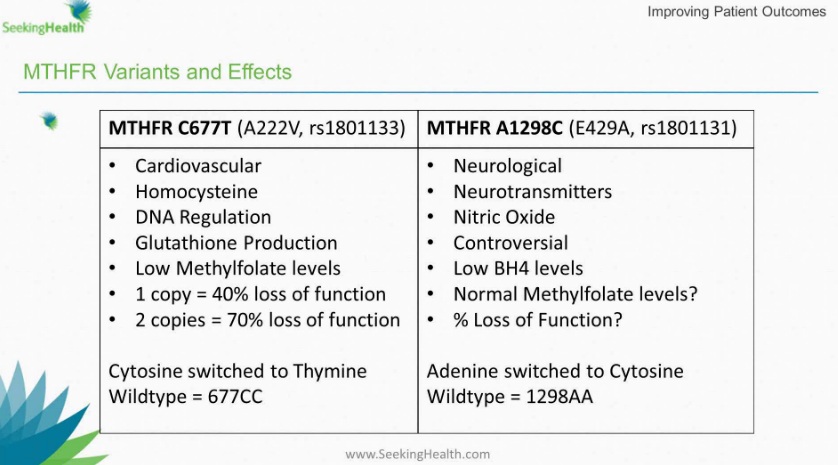So you heard about the Mother F**er Gene (yes, that’s what we all think when we see it) and now you want to know how to test for it and where to begin your research into understanding it. Awesome… get ready to enter a self-directed post-graduate program in genetics… but don’t fret, you will understand what you need to soon enough. And the amount you need to understand varies depending on the mutations you have, the symptoms, and whether you plan to enlist an MTHFR specialist to assist in your road to recovery.
Symptoms:
But first, what is MTHFR and what are the symptoms? Recurrent pregnancy loss is the most known side effect of MTHFR. However, most people are unaware of the 64 other associated conditions as tongue tie and even some heart defects, bedwetting, and scoliosis! This is a very difficult topic to understand, and this presentation by Dr. Ben Lynch is lengthy but simplifies a very complicated genetics discussion covering MTHFR and the related SNPs (aka other gene mutations). For the short list, there are 64 associated conditions listed here. However, you’re not going to understand HOW all these seemingly unrelated conditions are related until you’ve done some research… it’s quite unbelievable how important the process of methylation is.

Doctors:
There aren’t many doctors out there that specialize in Methylation but you can find a couple lists here and here. Take note that many alternative practitioners, including Chiropractors, are so highly specialized in MTHFR that they blow the brightest MD’s out of the water in their knowledge about Methylation. Unfortunately, these doctors are not usually covered by insurance (some insurance companies will reimburse partial fees), primarily because insurance will not pay for lengthy visits. This kind of specialty can not fit into the 15 or 30 minute window your insurance *might* be willing to cover. So you may have to choose between an out-of-pocket expense of around $250- $400/ hour for an MTHFR specialist, or hitting the books yourself. But we are getting ahead of ourselves here. I’ll have a new post in the very near future about what the results means and where to get more information.
Step one, testing. It can be done through your doctor’s office, through AncestryDNA, or through 23andMe [pending confirmation, we are hearing they may have removed MTHFR from 23ndMe testing]. Another option is through Amy Yasko’s testing (she is expensive and only covers about 30 genes, but provides a very extensive notebook full of information pertaining to those genetic mutations and printouts from your specific gene results). There are benefits to each one, but quite frankly getting it done through 23andMe or a similar mail-in option far outweighs getting it done in the doctors office. Here’s some quick information.
Doctors Office Testing:
- Covers MTHFR 677 but I hear that occasionally the doctor may forget to check for the other one, MTHFR 1298. Insurance will usually cover it, depending on your policy and proper diagnostic codes. However, when they forget to check for 1298 the first time, they may d
 eny it if 677 was already tested for and 1298 was left out. Be sure they are requested together.
eny it if 677 was already tested for and 1298 was left out. Be sure they are requested together. - If you have a deductible, it might actually exceed the price of the mail-order test, since getting it though the lab is far more expensive
- Regular doctors (and even geneticists) may not test for other mutations because they think they are irrelevant or they simply don’t know about them. Mutations such as CBS and COMT can be extremely important when considering you or your child’s methylation status because they work together.
- Testing in the office might benefit you in a case where the doctor is willing to sign a medical exemption, but needs a lab result to support his documentation rather than your printout from 23andMe.
Considerations:
- NutrEval offers MTHFR only through the mail, and 23andMe offers all your genetics for $199 (you get pages and pages of your genes). While 23andMe is not legally allowed to offer interpretations, the data can be downloaded and plugged into websites such as Genetic Genie or Livewello. When new studies come out about genes, you have your data on hand.
- You can do this anonymously if you choose, though it require a bit of maneuvering. This blog written by an attorney and privacy analyst discusses the steps on how to do it.
- Get your kit, spit in it, and send it back. If you’re doing more than one family member at the same time, be sure not to mix them up! Eek!
- You must be able to spit to use these kits (so no infants under age 2, the drool from an infant does not contain enough DNA to test)
Evaluating the results:
From the blog of Angela Knowles Griffiths, DC, an MTHFR specialist, she describes these options for reading your printed 23andMe reports:
- LiveWello – for $19.95 you get access to a standard variance report (that includes genes having to do with allergy, clotting factors, detox, gluten intolerance, IgA, IgE, IgG, methylation, mitochondrial function, other immune factors, sulfotransferase, thyroid, and tongue tie) as well as genetic tools and the ability to run specialized reports.
- Genetic Genie – for a suggested donation, you can have access to a methylation and detox report of your genes.
- Promethease – only $5, but it does not provide a variance report, give you a lot of information, some of which contradicts itself and some that contradicts information found consistently on other reports.
- MTHFRSupport/Sterling’s App – for $20 you receive a standard variance report (that includes information pursuant to eye health, detox, tongue tie/cleft palate, methylation, allergy/mold, IgE, IgA, IgG, clotting disorders, thyroid, celiacs/gluten intolerance, mitochondrial function and sulfonotransferase genes).
- Know Your Genetics – free, with a limited number of genes available on the report.
- NutraHacker – for $23 you can assess your carrier status for major disease and receive a list of potential supplements that you might want to take (but many of which contradict each other).
WARNING: the above descriptions are just my opinion. Many people have used and like each one, so you get to choose! At this time, my favorite is LiveWello, as you get the most amount of information for your $20 and it allows you and/or your physician to dig for more data if desired.
A Note About Confidentiality
This is a tricky one. Some people claim that a doctor’s office / lab may be more confidential than ordering a kit online and getting results in your email inbox. But I’m not convinced. Doctors offices are already going paperless. Our vaccination records in multiple states are currently accessible state-wide to medical offices and CPS. What’s to keep them from creating state-wide or nation-wide database for blood samples and genetics in the future? What’s to keep a future president from passing a law stating that all genetics tests on file be placed into a database for “convenience” or other ridiculous reasons? You could do 23andMe or AncestryDNA in ways that would stifle government ad pharmacetical overreach (have a friend buy it, use a fake name and a re-loadable credit card, etc) or at least place a few steps between them and your genetics profiles. But something to note is that while 23andMe is generally considered the best option, they are also partnering with the US government and now, pharmaceutical companies.
Now that you have the results… it’s time to join a group such as MTHFR 1298C, MTHFR Support, or MTHFR Gene Mutation on Facebook, or simply continue your research with the work of experts on the topic such as Ben Lynch from MTHFR.net.
For more resources / cited sources on this topic click here.
